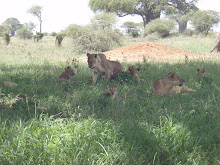I'll go ahead and warn you that what I have laid out below may be completely uninteresting to a number of people in regards to all the details. But in an organizational sense, maybe it'll help someone else, whether they are a pre-service teacher, graduate student, or just someone who absolutely cannot stand the thought of giving up all their old papers (I can't be the only one...can I?), with organizing the yearly accumulation of educational clutter :-P
1. Organize Biology content information and activities - I have folders of notes, labs, papers, and all sorts of other things from high school through grad school still tucked away in my house, so I have decided that before the end of March I am going to separate all of these pieces of paper out so that I can easily find and use them once I start teaching. By looking over the AL Course of Study (ALCOS) state standards for Biology I was able to simplify each of the 16 standards into a few words (don't shoot the messenger, I
know some of these groupings
do not make any sense...). When dealing with odd groupings I'll separate within the standard as well.
a. Scientific Method/Laboratories
b. Homeostasis/Macromolecules
c. Photosynthesis/Cellular Respiration
d. Organelles/Cell Theory (+microscopes)
e. Biological Organization (cells to ecosystems)
f. Mitosis/Meiosis/Reproduction
g. Heredity
h. DNA/RNA/Protein (+biotechnology)
i. Classification (Dichotomous keys, viruses)
j. Plant Differences
k. Animal Differences
l. Evolution
m. Energy Flow/Abiotic & Biotic Ecosystem Interactions
n. Biogeochemical Cycles/Human Impacts/ Ecological Succession
o. Biomes
p. Density-dependent and Density-independent Factors in Ecosystems/Biotic Interactions in Ecosystems
2. Organize Zoology content and activities - I'm going to separate some of the much more specific and detailed stuff I have laying around into the ALCOS standards for specific electives. I'm hoping this will simplify the retrieval process in the future! Plus, I'm really hoping that I'll end up teaching some of these electives in addition to Biology.
a. Anatomical Terminology
b. Body Plans
c. Body Symmetry
d. Invertebrates
e. Vertebrates
f. Species
g. Adaptation
h. Threatened/Endangered/Extinct Animals
i. Animal Behavior-Niche Field Study
3. Organize Anatomy and Physiology content and activities
a. Anatomical Terminology
b. Body Planes/Cavities/Abdominopelvic Regions
c. Cell Types
d. Tissue Types
e. Integumentary System
f. Skeletal System
g. Muscular System
h. Nervous System
i. Cardiovascular System
j. Digestive System
k. Respiratory System
l. Reproductive System
m. Urinary System
n. Endocrine System
o. Immune System
4. Organize Environmental Science content and activities - It is my ultimate hope and dream to end up teaching APES ;-)
a. Human Population/Industrial and Cultural Change/Technology
b. Fossil Fuels
c. Alternative Energy Sources
d. Pollution
e. H2O as the Universal Solvent
f. Freshwater Usage
g. Coastal H2O as a Resource/Marine vs. Inland Bodies of H2O/Marine Biodiversity
h. Water Pollution
i. Land-Use/Waste
j. Soil Classification and Formation (+climatic influence)
k. Erosion
l. + and - Human Impact on Biodiversity
5. Organize non-biological science content - I don't have too much of this, but depending on what the future brings me, I figure I better be prepared since I do have a lot of stuff laying around that could be helpful in a pinch.
a. Geology/Earth Science
b. Chemistry
c. Physics/Physical Science
d. Space Science
6. Graduation Stuff - Hopefully keeping all this stuff in one place will ensure I don't miss anything down the road...
a. Test results
b. Formal letters from the College of Education
c. Advising information
7. General Teaching Strategies - In addition to all of the content related papers lying around, I have also, since starting in the College of Education, begun to acquire a number of items that clarify and explain various teaching strategies and concepts such as lesson planning and Bloom's Taxonomy. This stuff should be separated out into it's own special pile.
a. Lesson planning/Objectives
b. Bell ringer ideas
c. Closure ideas
d. Assessment ideas
e. Special Needs strategies
f. Behavior management
g. Educational Theory
h. Graphic Organizers
i. Discussion strategies
j. Project/Problem-Based Learning examples (not Biology related)
k. Accommodations for different learning styles and multiple intelligences
Wish me LUCK!! I'm starting tonight... :-O

















